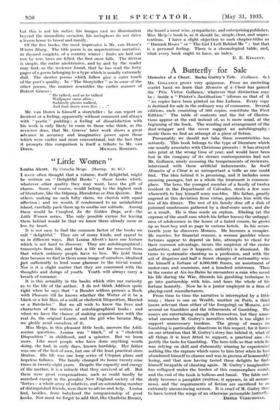" Little Women "
Louisa Alcoa. By Cornelia Meigs. (Harrap. 8s. 6d.) I HAVE often thought that a volume, itself delightful, might be written on Delightful Books " ; those books which, whatever other quality they may want, have the gift of charm. Some, of course, would belong to the highest rank of literature, like the Odyssey, Herodotus or Don Quixote. But others, making no such lofty claim, we cherish with equal affection ; and we would,- if condemned to an uninhabited island, carefully pack them up to soothe our solitude. Among these would be Cranford, In the Golden Days, and—the Little Women series. The only possible excuse for leaving them behind would be that we know them already more or less by heart.
It is not easy to fin& the common factor of the books we call " delightful." They are of many kinds, and appeal to us in different, ways. But Louisa Alcott's have one feature which is not hard to discover. They are autobiographical ; transcripts from life, and that a life not far removed from that which ordinary people have to live. We hold them dear because we find in them some image of ourselVes, idealized just sufficiently to lend some glamour to the trivial round. Nor is it a slight matter that they are concerned with the thoughts and doings of youth:- Youth will always carry a
breath of romance. - -
It is this actuality in the books which stirs our curiosity as to the life of the _author. 1. do not think Addison quite right when he says that " a Reader seldom peruses a Book with Pleasure till he. knows ..whether the Writer of it be a black or a fair Man, of a mild, or cholerick Disposition, Married or a Batchelor." But we all wish to know the lives and characters of the writers of autobiographical books ; and when we have the chance of making acquaintance with the real Jo, the original Laurie, and the girl who became Meg, we gladly avail ourselves of it.
Miss Meigs, in this pleasant little book, answers the Addi- sonian questions. Louisa was black," of a " cholerick Disposition " in childhood, and a spinster. But we learn more. Like most people who have done anything worth doing, she had, in early days, known hardship. Her father was one of the best of men, but one of the least practical since Brutus. His life was one long series of Utopian plans and hopeless failures. The family changed its home twenty-nine times in twenty-eight years. Deipite the capacity and energy of the mother, it is a miracle that they survived at all. But there were great compensations, such as could hardly be matched except in the peculiar New England society of the 'forties : a whole army of relatives, and an astonishing number of distinguished friends, were there to advise and help. Louisa had, besides, from babyhood the companionship of good books. Nor must we forget to add that, like Charlotte Bronte, she found a most wise, sympathetic, and enterprisingpublishei. Miss Meigs's book is, as it should be, simple, clear, and unpre- tentious. I have a slight objection to such chapter-titles as " Damask Roses " or " The Girl I Left Behind Me " ; but that is a personal feeling. There is a chronologibal table; and, what every book ought- to have, an index. -
E. E. KELLETT.


























































 Previous page
Previous page